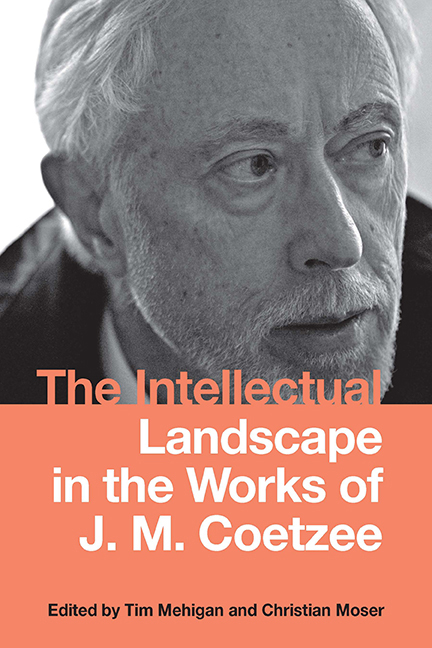Book contents
- Frontmatter
- Contents
- Acknowledgments
- Introduction: Coetzee's Intellectual Landscapes
- Part I Truth and Justification
- Part II Objectivity and Communication
- 6 Faith, Irony, Salt, and Possible Impossibilities: J. M. Coetzee's The Childhood of Jesus in Conversation with Zbigniew Herbert's “From Mythology”
- 7 Coetzee's Ethics of Language(s)
- 8 Force Fields
- 9 The Reading of Don Quixote: Literature's Migration into a New World
- 10 The Lives of Animals: From Rational Language to Speaking (of) Lions
- Part III Convergence of Interpretative Horizons and Moral Solidarity
- Notes on the Contributors
- Index
7 - Coetzee's Ethics of Language(s)
from Part II - Objectivity and Communication
Published online by Cambridge University Press: 03 July 2019
- Frontmatter
- Contents
- Acknowledgments
- Introduction: Coetzee's Intellectual Landscapes
- Part I Truth and Justification
- Part II Objectivity and Communication
- 6 Faith, Irony, Salt, and Possible Impossibilities: J. M. Coetzee's The Childhood of Jesus in Conversation with Zbigniew Herbert's “From Mythology”
- 7 Coetzee's Ethics of Language(s)
- 8 Force Fields
- 9 The Reading of Don Quixote: Literature's Migration into a New World
- 10 The Lives of Animals: From Rational Language to Speaking (of) Lions
- Part III Convergence of Interpretative Horizons and Moral Solidarity
- Notes on the Contributors
- Index
Summary
“La la fa fa yam ying tu tu.”
ON MACQUARIE ISLAND, an uninhabited island in the Southern Pacific Ocean belonging to Australia, Elizabeth Costello encounters an albatross. The bird “regards her steadily,” and Costello, leaving aside all the poetical associations the bird might evoke for a writer from Coleridge to Baudelaire, experiences a prelapsarian moment: “Before the fall, she thinks. This is how it must have been before the fall” (56).
Now, however—the lesson “The Novel in Africa,” the second from the book Elizabeth Costello, is, like almost the whole book, like most of J. M. Coetzee's prose, written in the present tense—now the Russian singer joins her, a woman who, like Costello herself, is a member of the education and entertainment staff on board the Northern Lights, a cruise ship on its way from New Zealand to South Africa. “‘An albatross,’” Costello explains to the Russian singer, “‘that is the English word. I don't know what they call themselves’” (56).
The language of the albatross had been lost even before the fall, since Adam, when naming the animals in Paradise, did not ask them how they call themselves (at least not according to Gen. 1:19ff). It is not just that the English word albatross does not reference any Adamitic primary language. This Adamitic language had already colonized the language of the animals themselves, an act of naming preceding other forms of violent domination, for example, that which characterized the “penguin industry” for which Macquarie Island had served as a hub in the nineteenth century (55).
This intimation of a pre-Adamitic language is, however, faint. More than once, Coetzee evokes moments of something beyond human language, but he never indulges in painting a world in which “non-verbal communication would break open the prison house of language.” Costello and the Russian singer do not lose themselves in devout contemplation of the bird so much as turn to a trivial topic: a man. The man in question is another member of the entertainment staff, the Nigerian writer Emanuel Egudu, with whom Elizabeth Costello had spent three nights many years before during a PEN conference in Kuala Lumpur. In the morning, immediately before the stopover at Macquarie Island, she had seen the singer coming out of Egudu's cabin (54), and perhaps, therefore, she feels a little jealous (57).
- Type
- Chapter
- Information
- The Intellectual Landscape in the Works of J. M. Coetzee , pp. 158 - 171Publisher: Boydell & BrewerPrint publication year: 2018
- 1
- Cited by



